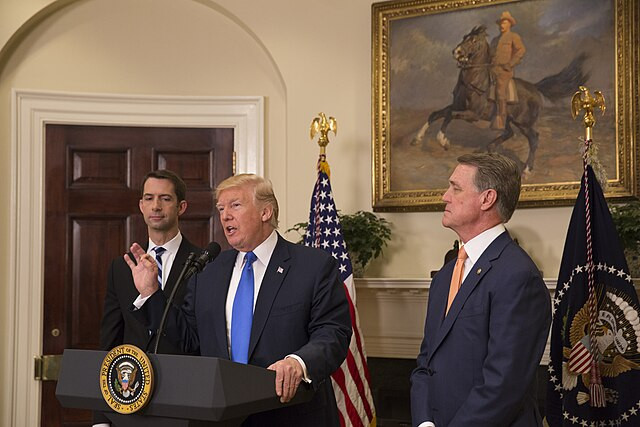Senate Republicans on Tuesday blocked a bipartisan bill designed to provide journalists with greater protections against government intrusion. The Protect Reporters from Exploitative State Spying Act (PRESS Act) failed to advance following an objection from Senator Tom Cotton (R-Ark.), who argued it posed a risk to national security.
The PRESS Act, which passed the Republican-led House earlier this year, sought to prevent the government from compelling journalists to disclose their sources and limit the seizure of their data without their knowledge. Despite bipartisan support, the bill faced opposition from President-elect Donald Trump, who urged Republicans to "kill this bill" in a Truth Social post last month.
During a Senate session, Senator Ron Wyden (D-Ore.) requested unanimous consent to pass the measure. However, Cotton objected, citing concerns about the potential misuse of protections afforded to journalists under the bill. "The press badge doesn't make you better than the rest of America or put you above the law," Cotton remarked on the Senate floor. He further asserted that the legislation could create a "protected class" of reporters and undermine national security.
In a social media post on X, Cotton elaborated, calling "No American citizen should be afforded the privilege provided in this bill, least of all the media." He contended that the proposed law would turn journalists into "the active accomplice of deep-state leakers, traitors, and criminals."
The bill's blockage marks a significant setback for press advocacy groups, which had hoped to see the PRESS Act enacted before President Joe Biden leaves office. Advocates argue the legislation is necessary to safeguard the free flow of information to the public and prevent overreach in government surveillance of journalists.
"This investigation highlights the need for a reasonable, common-sense law to protect reporters and their sources," Bruce D. Brown, executive director of the Reporters Committee for Freedom of the Press, said earlier on Tuesday. He referred to a Justice Department inspector general report that detailed government leak investigations during Trump's first term.
Senate Majority Leader Chuck Schumer expressed frustration over the bill's failure to advance, emphasizing the importance of protecting journalists from overreach by the government. Schumer urged Senate Republicans not to obstruct the legislation, writing on X (formerly Twitter) that the bill was designed to "ensure reporters can't be legally required to disclose sources or research files or hand over data held by phone and internet companies."
The PRESS Act's failure to progress adds to a growing list of legislative hurdles faced by Democrats in the final weeks of the Biden administration. With the lame-duck session focused on confirming judicial nominees and passing essential funding measures, the window for advancing bipartisan initiatives like the PRESS Act is rapidly closing.
Wyden, the bill's sponsor in the Senate, has pledged to continue discussions with Cotton and other Republicans in an effort to revive the legislation. Advocacy groups, including the Freedom of the Press Foundation, have called for the Senate to prioritize the bill, even suggesting lawmakers cut their holiday break short to address the issue.






